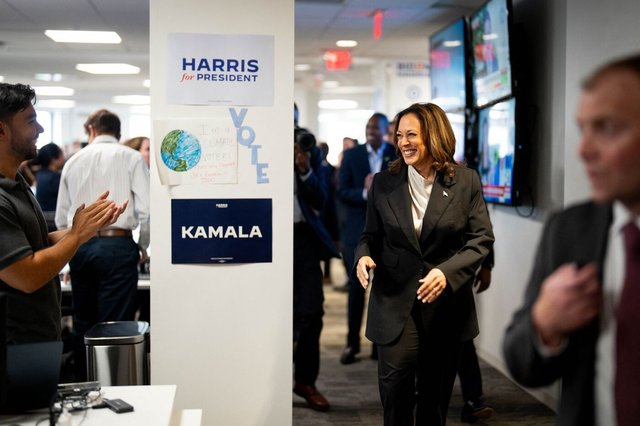
Charlie Wells
July 29, 2024
It was hardly one month ago that Joe Biden stumbled in the debate. Two weeks since the assassination attempt on Donald Trump. Just under a week since Kamala Harris jumped into the race.
The breakneck news cycle is amplifying the urge in many Americans — on both sides of the aisle — to move beyond anxious doom-scrolling and get involved in a historic election. The campaigns of Trump and now Harris have attracted millions in donations in recent weeks, pulling in money from first-time contributors and breaking fundraising records.
But in an era when billionaires and Wall Street titans can cut eight-figure checks to influence elections, does a $500 contribution to a candidate from an average person move the needle? Or is there a better return on investment in volunteering for a campaign? These questions are suddenly top of mind, as Americans ponder how they can actively participate in the race.

Kamala Harris greets staff at campaign headquarters in Wilmington, Delaware on July 22.Photographer: Erin Schaff/AFP/Getty Images
Money Before Time
In general, campaigns value money they can spend to pay staff and buy advertising over time spent volunteering, according to John Costello, an assistant professor of marketing at the University of Notre Dame who has studied the decision making of donors to charities and political groups.
Still, his research indicates that many donors prefer to give their time, even if the impact is lower.
“A big driver is people having perceptions of control over the donated resource,” Costello said. “When you donate your time, you’re understanding the impact in real time. You might be there in a political context, canvassing, seeing that you’re changing people’s minds and that has a pretty important psychological benefit for people.”
Individuals can give $3,300 to each candidate in the general election, according to the Federal Election Commission. There are also political action committees, or PACs, which pool contributions and donate those funds to campaigns. The limit for individuals is $5,000 per year. And super PACs accept donations in unlimited amounts of money for so-called independent expenditures like advertising.
Both Democrats and Republicans also have arms that focus on House and Senate races. Donation limits to parties are much higher: An individual can give $41,300 per year.
Moral Praise
Still, research shows that many people view donating their time as “more morally praiseworthy” than giving cash. Time donated serves as a greater “signaling” function than money spent. Putting that in the terms of the everyday professional: Saying you spent the afternoon knocking on doors in a swing state makes a better story at a dinner party than saying you cut a check for your preferred politician.
There are ancillary benefits of donating time — especially now. The American Psychiatric Association’s recently published annual mental health poll shows that 73% of US adults are anxious about this year’s election. That can only be expected, given the assassination attempt on Trump, Biden’s withdrawal and heated rhetoric coming from both sides.
Kristy Archuleta, a professor of financial planning at the University of Georgia, said volunteering can be a helpful way for the everyday person to reduce anxiety.
“In political campaigns, people who are contributing time surround themselves with like-minded people who offer social support through working together toward a mutual cause and a sense of belonging,” she said. “Both can reduce anxiety.”
Short on Time
Of course, some people are just too busy to give time. Jay Townsend, a nonpartisan political consultant, gives money to candidates he likes or to whom he thinks his money will help. He doesn’t mind how they use it, be it on pizza for volunteers or on advertising. His view is that campaigns need to take from donors what they can get, be it time or money.
Still, after all his years advising campaigns, Townsend says he has seen one big upside of giving time.
“A lot of marriages have been spawned by younger people who met each other in a political campaign,” he said.
© 2024 Bloomberg L.P.


